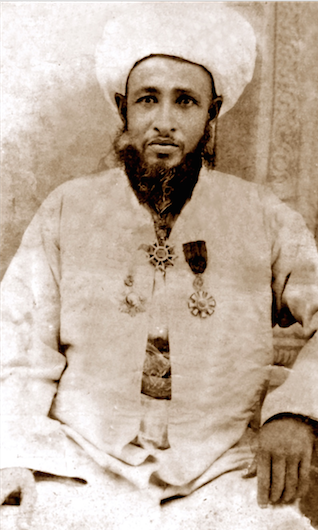Habib Ahmad bin Abu Bakr bin Sumayt, the father of Habib Umar bin Sumayt (may Allah have mercy on them and sanctify their secret) discusses the means of attaining Allah’s love.
It is inconceivable that Allah’s love be in any way similar to human love, which may be defined as tenderness in the heart. Some scholars say Allah’s love is expressed in His actions such as showing His favour and bounty to His slave, or showing His slave special care by protecting him and drawing him close.
As for the slave’s love for Allah, it is expressed initially in his submission to Him, in his seeking Allah’s pleasure and in avoiding everything that displeases Him. At a higher stage it is a lofty station that words cannot express, the product of the purification of the soul from all worldly attachments. Someone who has reached this stage is unable to part with his Beloved and finds comfort in constant remembrance of Him.
The means of attaining this love are numerous. Here are some of them:
- Reflecting upon Allah’s generosity in bestowing His blessings upon His slave, forgiving his wrongdoings and enabling him to do good works.
- Not relying upon one’s actions, and witnessing one’s shortcomings.
- Striving to perform compulsory and supererogatory actions to the best of one’s ability in accordance with the Sunnah until one attains the proximity mentioned in the hadith qudsi – “My slave continues to draw close to Me by performing supererogatory actions until I love him.”
- Remembering Allah and standing in prayer before dawn in a state of neediness, seeking the gifts that Allah bestows at such times. The hadith tells us that Allah has “breezes” which He sends at blessed times and that we should expose ourselves to receive those breezes, at whatever time they may blow.
- Making abundant supplication while manifesting one’s neediness, in obedience to Allah’s command: Call upon Me and I will surely answer you.[1] As the hadith says: “Supplication (du`a) is the essence of worship,” since the person calling upon Allah has given up hope in all other than Him. He thus realises the oneness of Allah and attains true sincerity, which together are the greatest form of worship.
Allah is displeased if you do not ask Him
Whereas the small child of Adam becomes angry when you ask him
- Attempting to imitate the lovers of Allah and their states by, amongst other things, reading their works.
- Keeping a good opinion of Allah, which is a noble station and one of the stations of certainty (yaqin). The elect have a good opinion of Allah due to their knowledge of His sublime attributes, whereas the ordinary believers have a good opinion due to the blessings they receive from Him. If the believer is unable to reach the rank of the elect then he should witness the blessings that Allah bestows upon him, and trust that Allah will benefit him and deflect harm from him while being extremely hopeful that Allah will accept his actions and forgive his wrongdoings. The believer should have an especially good opinion of Allah at the time of death, since the Prophet said ﷺ: “Let none of you die except having the best opinion of Allah.” Allah says in the hadith qudsi: “I am as my slave believes Me to be, so let him believe what he wishes.
- Taking oneself to account and repenting from all wrongdoings since repentance (tawbah) is the first station of the path to Allah. The seeker should seek much forgiveness from Allah and weep over the time that he has wasted.
- Being constantly aware of Allah in all states.
***
The above is an extract from al-Kawkab al-Zahir, a commentary on Imam al-Haddad’s poem Nasim Hajir.
Habib Ahmad bin Abu Bakr bin Sumayt , was born in 1277 Hijri (1861 CE) in the Comoros Islands. Habib Ahmad received his early education from his father and then travelled to Hadramawt in search of knowledge in 1298. He lived in the city of Shibam and would make regular visits to Tarim and Seiyun and other parts of Hadramawt. He received inward and outward knowledge from masters such as Habib `Aydarus bin `Umar al-Habashi, Habib Ahmad bin Hasan al-`Attas, Habib `Abd al-Rahman bin Muhammad al-Mashhur, Habib `Ubaydullah bin Muhsin al-Saqqaf and Habib `Ali bin Muhammad al-Habashi, who was the shaykh from whom he received his opening. In 1300 he travelled to Zanzibar, where he was appointed Qadi by the Sultan. However, he had a longing to travel the earth and in 1303 he left Zanzibar, going first to Istanbul, where he was graciously received by Sultan `Abd al-Hamid, and then to Egypt, the Hijaz, Java and India. In 1305 he returned to Zanzibar and was reinstated as Qadi. He once again visited Hadramawt in 1316 but lived out the rest of his days in Zanzibar, where he died in 1343 (1924). He authored a number of works, which include commentaries on the works of Imam al-Haddad, and some of his fatwas were collected. His son Habib `Umar went on to become a great scholar and caller to Allah. May Allah benefit us by Habib Ahmad and his progeny.
[1] Ghafir 40.60

